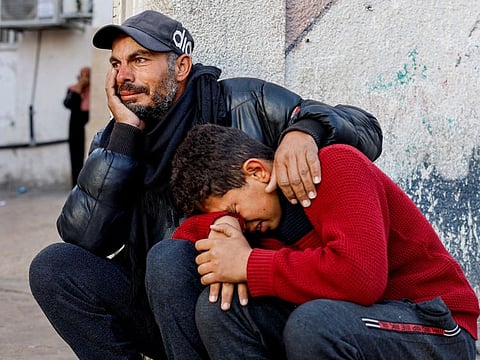Israel-Gaza war: Prospects for ceasefire dim as Israel rejects calls to spare Rafah
Hamas chief reiterates group’s demands which Netanyahu called ‘ludicrous’

GAZA STRIP: Prospects for an Israel-Hamas ceasefire dimmed on Sunday after mediator Qatar acknowledged that truce talks on the other diplomatic front have hit an impasse.
The languishing efforts to pause the four-month-old war come as Israeli Prime Minister Benjamin Netanyahu vowed on Saturday to reject international appeals to spare Gaza’s southernmost city Rafah, where an estimated 1.5 million people have sought refuge.
Israel’s relentless campaign to root out every Hamas battalion has edged closer to the city, with overnight attacks killing at least 10 Gazans there and in central Gaza’s Deir Al Balah, according to a tally by official Palestinian news agency Wafa.
The Gaza war began with Hamas’s October 7 attack which resulted in the deaths of about 1,160 people in Israel, mostly civilians, according to an AFP tally of Israeli official figures.
Militants also took about 250 people hostage, 130 of whom are still in Gaza, including 30 who are presumed dead, according to Israeli figures.
Israel’s retaliatory assault on Gaza has killed at least 28,858 people, mostly women and children, according to the Hamas-run territory’s health ministry.
Neighbouring Egypt has grown increasingly wary that an Israeli invasion of Rafah could force the Gazans trapped there across the border.
President Abdul Fattah Al Sissi on Saturday reiterated Egypt’s opposition to any forced displacement into the Sinai desert.
In a phone call with French President Emmanuel Macron, both leaders agreed instead on the “necessity of the swift advancement of a ceasefire,” according to a summary.
Even if a temporary truce deal is struck at the talks in Cairo, Netanyahu said his troops’ ground invasion of Rafah will go ahead.
“Even if we achieve it, we will enter Rafah,” he said at a televised news conference Saturday.
Countries urging Israel otherwise are effectively saying “lose the war”, he said.
Netanyahu spoke as thousands of Israelis protested in Tel Aviv, the latest public call for an immediate election by demonstrators who also accuse the government of abandoning hostages.
“Take politics out of decisions about our loved ones’ lives,” said Nissan Calderon, brother of hostage Ofer Calderon. “This is the moment of truth, there won’t be many more like it if the Cairo initiative collapses.”
Fears for patients after raid
Earlier, Hamas chief Ismail Haniyeh reiterated the group’s demands, which Netanyahu called “ludicrous”.
They include a complete pause in fighting, the release of Hamas prisoners and the withdrawal of Israeli troops from Gaza.
Netanyahu has also rejected pressure from some Western governments for unilateral recognition of a Palestinian state.
“After the terrible massacre of October 7, there can be no greater reward for terrorism than that and it will prevent any future peace settlement,” he said.
Israel said Saturday it has detained 100 people from one of Gaza’s few operating hospitals after troops raided the complex.
At least 120 patients and five medical teams are stuck without water, food and electricity in Nasser Hospital in Gaza’s main southern city of Khan Younis, according to Gaza’s health ministry.
Israel has for weeks concentrated its military operations in Khan Younis, the hometown of Hamas’s Gaza leader Yahya Sinwar, whom Israel accuses of masterminding the October 7 attack.
Intense fighting has raged around Nasser Hospital.
The Israeli military said troops entered the hospital on Thursday, acting on what it said was “credible intelligence” that hostages had been held there. It later acknowledged it found no firm evidence that they had.
‘We need food now’
The power was cut and the generators stopped after the raid, leading to the deaths of six patients due to a lack of oxygen, according to Gaza’s health ministry.
A witness, who declined to be named for safety reasons, told AFP the Israeli forces had shot “at anyone who moved inside the hospital”.
In northern Gaza, many are so desperate for food they are grinding up animal feed.
“We’re going to die from hunger, not by bombs or missiles,” said Mohammed Nassar, 50, from Jabaliya in the territory’s north.
As a much-needed delivery of supplies arrived in southern Gaza Saturday, the UN again warned that Gazans are close to famine.
The deliveries are also complicated by Palestinians in Rafah so hungry that they are stopping aid trucks to take whatever they can manage, according to the UN.
Sign up for the Daily Briefing
Get the latest news and updates straight to your inbox

